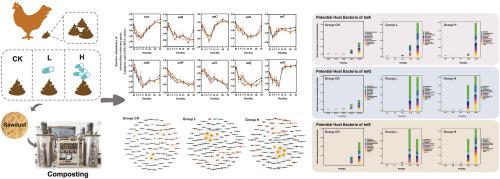Journal of Cleaner Production ( IF 9.7 ) Pub Date : 2023-05-17 , DOI: 10.1016/j.jclepro.2023.137516 Qing Liu , Xin Wen , Xinhua Li , Shan Zhong , Zhen Cao , Xin Zhang , Baohua Ma , Yongde Zou , Na Zhang , Jiandui Mi , Yan Wang , Xindi Liao , Yinbao Wu

|
Livestock manure is considered as an important reservoir of antibiotic resistance genes (ARGs). Antibiotics used in livestock production can stress microorganisms and lead to the spread of ARGs, yet composting is viewed as an effective means of reducing ARGs. However, it remains unclear why ARGs typically decline at high composting temperatures but rebound during compost maturation with varied concentrations of antibiotics. Two concentrations of doxycycline (5 and 20 mg/kg) were added to manure of laying hen mixed with sawdust for composting to evaluate changes in ten tetracycline resistance genes (TRGs) and two mobile genetic elements (MGEs), and to investigate the rebound of TRGs during compost maturation. The results showed that the total absolute abundances of TRGs continuously decreased in all compost treatments. Compared with the start (day 0), the relative abundance of tetA, tetG and tetX in the three compost treatments significantly decreased at thermophilic stage (day 3-day 8), but rebounded in the maturation stage (day 9-day 25) (P < 0.01). 16S rRNA sequencing showed that the relative abundance of Proteobacteria and Bacteroidetes in the three groups decreased significantly at thermophilic stage (day 3-day 8) compared with the mesophilic stage (day 0-day 2) and then increased significantly during the maturation stage (day 9-day 25) (P < 0.05), while Firmicutes showed the opposite trend. Pearson correlation analysis showed the strong correlation between the rebound TRGs and major bacteria, such as Proteobacteria and Bacteroidetes, under doxycycline stress. It suggested that the potential host bacteria caused the rebound of TRGs during compost maturation under doxycycline stress. RDA and VPA analysis showed that Marinimicrobium, Pusillimonas and Sphingobacterium contributed to the rebound of tetA, tetG and tetX. This study provides insights into the rebound of ARGs typically seen during the compost maturation stage and a reference for evaluating the risk of spreading ARGs in the process of manure composting treatment.
中文翻译:

多西环素通过增加潜在宿主菌的丰度诱导蛋鸡粪便堆肥成熟过程中三种四环素抗性基因的反弹
牲畜粪便被认为是抗生素抗性基因 (ARG) 的重要储存库。畜牧生产中使用的抗生素会对微生物造成压力并导致 ARG 的传播,但堆肥被视为减少 ARG 的有效手段。然而,目前尚不清楚为什么 ARG 通常在高温堆肥时下降,但在不同浓度的抗生素堆肥成熟期间反弹。将两种浓度的多西环素(5 和 20 mg/kg)添加到混合木屑的蛋鸡粪便中进行堆肥,以评估 10 种四环素抗性基因(TRGs)和 2 种移动遗传元件(MGEs)的变化,并研究堆肥成熟过程中的 TRG。结果表明,在所有堆肥处理中,TRG 的总绝对丰度持续下降。三种堆肥处理的tet A、tet G和tet X在嗜热期(第3天-第8天)显着下降,但在成熟期(第9天-第25天)出现反弹( P < 0.01)。16S rRNA测序显示,与中温阶段(第0天-第2天)相比,三组变形杆菌和拟杆菌的相对丰度在嗜热阶段(第3天-第8天)显着下降,然后在成熟阶段(第2天)显着增加9 天 25) ( P < 0.05),而厚壁菌门则表现出相反的趋势。Pearson 相关性分析表明,在多西环素胁迫下,反弹 TRG 与变形杆菌和拟杆菌等主要细菌之间存在很强的相关性。这表明潜在的宿主细菌在多西环素胁迫下堆肥成熟过程中引起了 TRGs 的反弹。RDA 和 VPA 分析表明,海洋微生物、假单胞菌和鞘氨醇杆菌有助于tet A、tet G 和tet的反弹X. 本研究提供了对堆肥成熟阶段常见的 ARGs 反弹的见解,并为评估 ARGs 在粪便堆肥处理过程中扩散的风险提供了参考。




















































 京公网安备 11010802027423号
京公网安备 11010802027423号